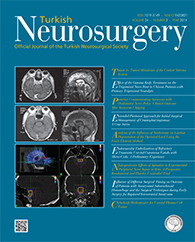2Pamukkale University, Faculty of Medicine, Department of Anatomy, Denizli, Turkey
3Duzce University, Faculty of Medicine, Department of Medical Pharmacology, Duzce, Turkey
4Izmir University, Faculty of Medicine, Department of Anatomy, Izmir, Turkey DOI : 10.5137/1019-5149.JTN.8428-13.2 AIM: Epileptic seizures lead to neuronal loss in the hippocampus. Experimental epilepsy can be induced by direct application of various chemicals to cerebral cortex. Nifedipine is an L-type voltage-dependent calcium channel blocker. In spite of several studies that show the seizure-suppressing effects of nifedipine, it has been shown that nifedipine does not suppress but conversely increases epileptic seizures. Similarly, contradictory effects of nifedipine have been reported, such as neuroprotection, failed neuroprotection and neurotoxicity. We therefore aimed to investigate the effect of nifedipine on hippocampal neuronal loss in penicillin induced epileptic rats in this study.
MATERIAL and METHODS: The effect of nifedipine on total hippocampal neuron number was estimated by using the optical fractionator method (an unbiased stereological method) in penicillin-G induced epileptic rats.
RESULTS: The total number of hippocampal neurons in the control group was 183687 ± 3184. In the penicillin-induced group, the total neuron number significantly decreased to 146318 ± 3042 compared to the control group. In the nifedipine group, the neuron number significantly decreased to 128873 ± 1157 compared to both control and penicillin-induced groups.
CONCLUSION: Nifedipine increased neuronal loss and did not suppress epileptic seizures in penicillin-induced epileptic rats. Nifedipine could not protect against hippocampal neuronal loss in penicillin-induced epileptic rats.
Keywords : Penicillin epilepsy model, Nifedipine, Hippocampus, Neuron number, The optical fractionator method, Rat, Epilepsy, Seizure




